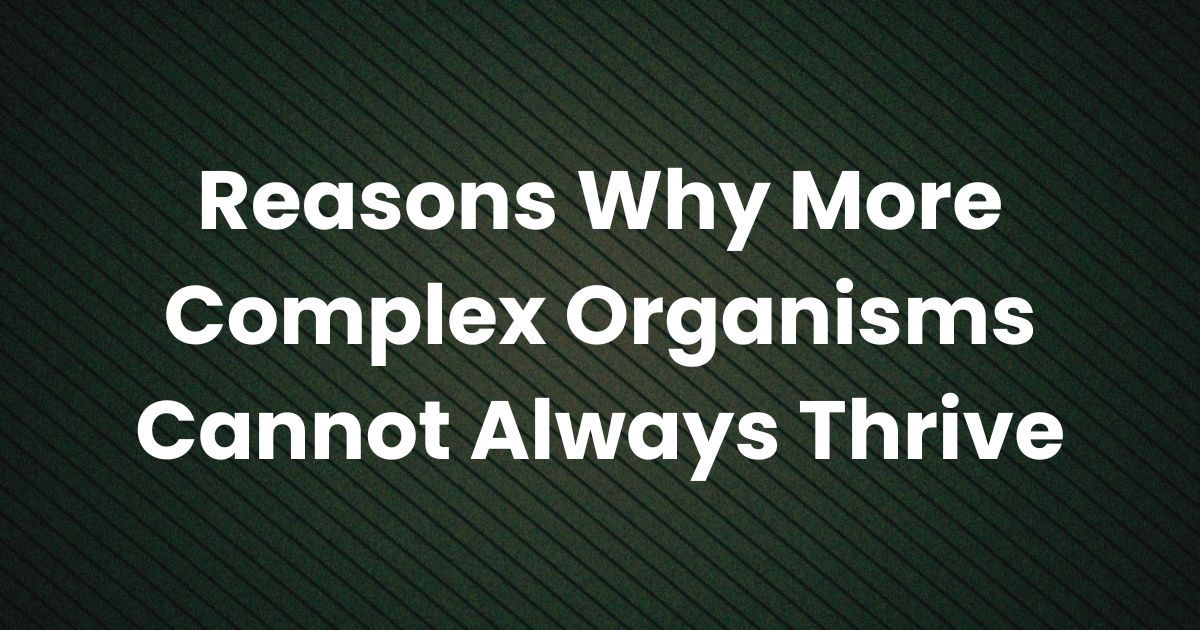
The straightforward solution is that while complexity in organisms can offer many advantages, it also comes with significant trade-offs that can limit their success in certain environments. In this discussion, we explore several reasons why more complex organisms may not always be the most evolutionarily or ecologically successful.
1. High Energy Demands
- Metabolic Cost:
More complex organisms generally require more energy to sustain their numerous cellular processes, complex organs, and intricate behaviors. This high metabolic demand means that they must secure a consistent and abundant energy supply. In environments where resources are scarce or fluctuate dramatically, these organisms may struggle to meet their energy needs compared to simpler organisms.
2. Slower Reproduction and Adaptation
- Reproductive Rate:
Increased complexity often correlates with longer gestation periods, slower growth rates, and lower reproductive rates. This makes complex organisms less capable of quickly adapting to rapid environmental changes or recovering from population declines. - Genetic Variation:
Simpler organisms, with their faster life cycles, can accumulate genetic variations more quickly. This rapid turnover allows them to adapt faster to changing conditions, giving them an evolutionary advantage in unstable environments.
3. Increased Vulnerability to Mutations
- Genomic Complexity:
With a more complex genome, there is a higher chance for errors during DNA replication. Although many complex organisms have sophisticated repair mechanisms, the sheer volume of genetic material and the intricacies of gene regulation can lead to mutations that negatively affect critical functions. - Developmental Constraints:
Highly complex organisms have intricate developmental processes. A small error in the developmental cascade can have wide-ranging impacts on the organism’s structure and function, making them potentially less resilient to genetic or environmental disturbances.
4. Trade-Offs in Specialization
- Niche Specificity:
Complex organisms are often highly specialized, having evolved to thrive under a narrow set of environmental conditions. This specialization can make them vulnerable if those conditions change, whereas simpler organisms might be more generalized and adaptable to a broader range of environments. - Flexibility vs. Efficiency:
While complex systems can perform a variety of functions, they may lack the flexibility of simpler systems when rapid adaptation is required. In fluctuating environments, the ability to quickly adjust can be a significant survival advantage.
5. Environmental Constraints
- Habitat Limitations:
Certain environments, such as extreme climates or resource-poor ecosystems, may not support the high demands of complex life forms. In such settings, simpler organisms—often with lower energy requirements and faster reproduction rates—can outcompete their more complex counterparts. - Ecological Interactions:
Complex organisms are typically integrated into intricate ecological networks. Disruptions—such as the loss of a keystone species or habitat degradation—can have cascading effects that disproportionately impact these organisms compared to simpler ones with fewer dependencies.
Conclusion
In summary, more complex organisms cannot always thrive due to a range of constraints including high energy demands, slower reproduction rates, increased vulnerability to mutations, specialization trade-offs, and environmental limitations. While complexity can enable sophisticated functions and adaptations, it also comes with inherent costs that can reduce an organism’s resilience and adaptability in certain situations.
Understanding these trade-offs helps explain why simpler organisms often persist and dominate in environments where resources are limited or conditions are rapidly changing. The balance between complexity and survival is a key aspect of evolutionary biology, highlighting that more complexity is not always synonymous with greater success in the natural world.
Also Check:
• How Overfishing and the Decimation of Forests Prove Harmful: A Comprehensive Analysis
• Resource Rich but Economically Backward Regions: An In-Depth Exploration
• How Polyembryony Can Be Commercially Exploited
• How Can Algae and Fungi Mutually Benefit Each Other? An In-Depth Exploration




1 thought on “Reasons Why More Complex Organisms Cannot Always Thrive”